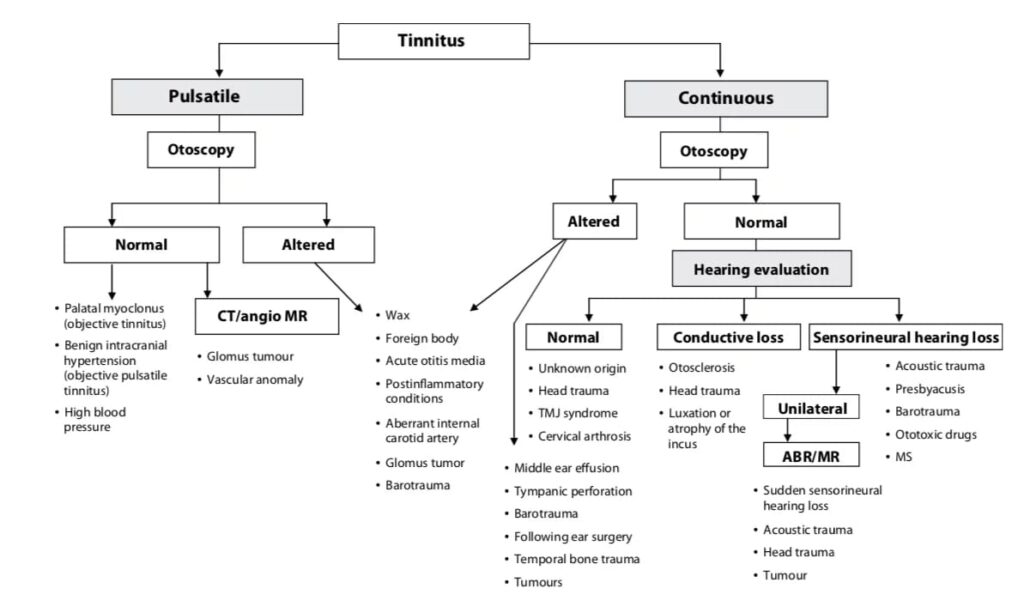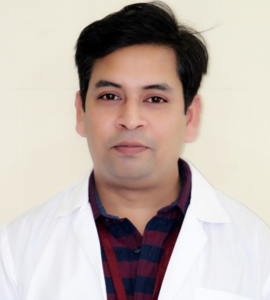The word ‘Tinnitus’ is derived from a latin word ‘tinnire’ which means ‘to ring’. Tinnitus is a symptom and not a disease per se. The patient complains of chirping, buzzing, musical, tones, hissing, machinery, rustling, swishing or clicking noises in the one, both ears or in the middle of head and origin of this sound is withinthe patient. Unilateral tinnitus is more commonly seen but it can occur in bilateral ears. These symptoms are more intrusive at night due to quiet environment.
RISK FACTORS:
- Increasing age.
- Hearing loss.
- Ear diseases. Meniere’s disease, otosclerosis, vestibular schwannoma.
- Smoking.
- Alcohol intake.
- History of head injuries, cardiovascular disease and hypertension.
- Anxiety and depression.
- Temporomandibular joint dysfunction.
TYPES OF TINNITUS:
- Subjective Tinnitus Vs Objective Tinnitus
- Pulsatile Tinnitus Vs Non-Pulsatile Tinnitus
(Pulsatile is further sub-divided into synchronous & Non-synchronous)
The most common presentation of tinnitus is subjective non-pulsatile tinnitus with no associated disease other than presbycusis: this is also known as subjective idiopathic tinnitus. Description of sounds can be in any form such as humming, whistling, voices, music, ringing sounds.
| SUBJECTIVE TINNITUS | OBJECTIVE TINNITUS | |
| Definition | Perception of sound sensation only by the patient in absence of external source. | Sound sensation may even be heard by others – It may be unaided or by using stethoscope, microphone and amplifier. |
| Origin | 1. Ear disease – Wax, Otitis media (Acute/ chronic/serous), Noise-induced hearing loss, Idiopathic sudden SNHL, Meniere’s disease, Presbycusis, , Vestibular schwanomma. 2. Metabolic – Thyroid disorders, Vitamin B12 deficiency, Obesity/ Hyperlipidaemia. 3. Neurologic – Head injury, Temporal bone fractures, Whiplash injury, Multiple sclerosis, Postmeningitic, Brain haemorrhage, Brain infarct 4. Cardiovascular – Hypertension, Hypotension, Anaemia, Cardiac arrhythmia, Arteriosclerosis 5. Ototoxic drugs 6. Psychogenic – Anxiety, Depression |
1. Vascular – AV shunts, Congenital AV malformations, Glomus tumour of middle ear · 2. Carotid aneurysm, Carotid stenosis, Vascular loop pressing on VIIIth nerve in internal auditory canal, High-riding carotid artery, Persistent stapedial artery, Venous hum, Dehiscent jugular bulb 3. Patulous eustachian tube, Palatal myoclonus, Idiopathic stapedial or tensor tympani myoclonus, Dental, Clicking of TM joint |
| Description of sounds | Chirping, buzzing, hissing, machinery, or rustling noises. | 1. Pulsatile noise – Aberrant blood vessel or paraganglioma. 2. Fluttering/ thumping noise – Stapedial, tensor tympani or palatal myoclonus.· 3. Swishing noise – Vascular lesions, e.g. glomus tumour /carotid artery aneurysm. It is synchronous with pulse and can be abolished by pressure on the common carotid artery. 4. Clicking sound – Palatal myoclonus produces due to clonic contraction of the muscles of soft palate and can be easily diagnosed. 5. Tinnitus synchronous with respiration may be due to abnormally patent eustachian tube. |
| PULSATILE TINNITUS | NON-PULSATILE TINNITUS |
| The perceived sound is in the form of a rhythmical pulsation. | Perception of sound sensation is not rhythmical. |
| Synchronous (Perception of sound sensation rhythmical with patient’s heartbeat or arterial pulse. It is mainly because of turbulent or irregular blood flow due to abnormal vascular anatomy in the close proximity.) 1. Intracranial hypertension 2. Atherosclerosis 3. Paraganglioma 4. Arterio-venous malformation 5. Carotid artery stenosis 6. Persistent stapedial artery 7. Pregnancy and thyrotoxicosis 8. Pseudotumour cerebri Non-synchronous (Perception of sound sensation is rhythmical fluttering noise, clicks or a buzzing sensation that is not synchronous with patient’s heartbeat or arterial pulse.) 1. Palatomyoclonus 2. Middle ear spasm (contraction of the tensor tympani and/or stapedius muscle) |
1. Spontaneous otoacoustic emission 2. Patulous eustachian tube. |
Psychogenic tinnitus.
No cause detected in the ear or central nervous system. Tinnitus needs to be differentiated from auditory hallucinations in which a person hears voices or other organized sounds like that of music. It is seen in mentally ill patients.
ASSESSMENT OF A PATIENT:
History
- Tinnitus: Unilateral/ Bilateral,Constant/ Intermittent – If intermittent, duration & frequency of episodes, aggravating or relieving factors.
- H/o Hearing loss, discharge or ear surgery, loud sound, giddiness, ototoxic drugs, head trauma or any other systemic illness.
- Personal History: Alcohol, smoking, diet (tea, coffee, fish).
- Occupational History.
- Family history of hearing loss.
Clinical examination.
- Inspection of the ears to look for any congenital anomalies or scars indicating trauma or surgery.
- Look for tympanic membrane perforation, middle ear effusion/fluid, cholesteatoma or any vascular lesion.
- Tuning fork tests.
- Cranial nerves examination.
- Auscultation of the neck, temporal and mastoid regions for bruits (vascular lesion) is required in cases of pulsatile tinnitus.
Investigations.
- PTA. Type and degree of hearing loss.
- MRI. In cases of unilateral tinnitus to rule out vestibular schwannoma and vascular lesions within head and neck.
- Tympanometry and stapedial reflexes are done to diagnose any middle ear pathology present, tensor tympani or stapedial myoclonus.

TREATMENT MODALITIES
Psychological:
- It is the most effective remedy. Education about dealing with tinnitus and habituation strategies, psychological reassurance and counselling to curb negative reactions to tinnitus, Cognitive behavioural therapy and biofeedback. Negative counselling – passing comment like “there is no cure for tinnitus and nothing can be done” should be avoided.
Medical:
- Benzodiazepines & Selective serotonin reuptake inhibitors are widely used to treat associated anxiety and depression.
Complementary medicine regimes:
- Ginkgo biloba, combination supplements, acupuncture, aromatherapy, ear candles, hypnotherapy, meditation, reflexology, tai chi and yoga sessions are utilized as relaxation techniques.
Devices to mask tinnitus
- Hearing aids. Improvement in hearing loss may in part reduce patient’s symptoms.
- Tinnitus maskers resembles hearing aid and it delivers low level white noise. It works on principal of residual inhibition in patients with normal hearing.
- Tinnitus instrument is a combination of a hearing aid and a masker in one device.
- Novel sound device. Neuromonics is device that delivers music of large dynamic range with peaks and troughs. The tinnitus sound is audible in troughs.
Tinnitus retraining therapy.
- Helps people to manage the impact of tinnitus on their day to day life.
- Habituation of reaction to curb negative reactions to tinnitus. Habituation of tinnitus to block transmission of neuronal activity so that tinnitus sound is not bothersome.
- Therapy consists of Counselling and Sound therapy. Patient is exposed to environmental sounds, music radio, television, or use of hearing aids (in case he suffers from hearing loss). In general, he should avoid silent environment. To produce external sound for habituation, sound generators are used which produce continuous low-level, broad-band noise for at least 8 h a day. Sound, here is used not for masking the tinnitus but is adjusted to remain at a low level, for habituation. TRT needs a long period of 18–24 months but gives a significant improvement in more than 80% of patients.
Surgery.
- In pulsatile tinnitus, microvascular decompression of vascular loops which are in close proximity to the cochlear nerves and surgical division of the middle ear tendons in middle ear spasm has given good results.
———– End of the chapter ————
Learning resources.
- Scott-Brown, Textbook of Otorhinolaryngology Head and Neck Surgery.
- Glasscock-Shambaugh, Textbook of Surgery of the Ear.
- Logan Turner, Textbook of Diseases of The Nose, Throat and Ear Head And Neck Surgery.
- Rob and smith, Textbook of Operative surgery.
- P L Dhingra, Textbook of Diseases of Ear, Nose and Throat.
- Hazarika P, Textbook of Ear Nose Throat And Head Neck Surgery Clinical Practical.
- Mohan Bansal, Textbook of Diseases of Ear, Nose and Throat Head and Neck surgery.
- Anirban Biswas, Textbook of Clinical Audio-vestibulometry.
- W. Arnold, U. Ganzer, Textbook of Otorhinolaryngology, Head and Neck Surgery.
- Salah Mansour, Textbook of Comprehensive and Clinical Anatomy of the Middle Ear.
Author:

Dr. Rahul Kumar Bagla
MS & Fellow Rhinoplasty & Facial Plastic Surgery.
Associate Professor & Head
GIMS, Greater Noida, India
msrahulbagla@gmail.com
